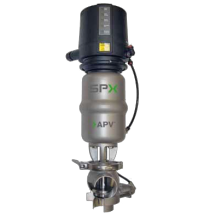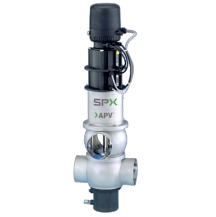A mixproof valve is a vital component in processing systems, especially in industries like food and beverage, pharmaceuticals, and chemicals. It serves to prevent cross-contamination between two different product streams within a single pipeline. Featuring dual valve discs or seals within a sole valve body, it creates a secure barrier when closed, ensuring the separation of fluids. This capability is crucial where simultaneous handling of diverse products is necessary, safeguarding product integrity and safety. Moreover, mixproof valves are designed for easy cleaning using CIP (clean-in-place) and SIP (Steam-in-place) systems, ensuring optimal hygiene standards. Overall, these valves are indispensable for maintaining product quality and safety in processing industries.



Mixproof Valves
6 series from 1 manufacturers
-
- Analysis
- Circulation
- Cleaning
- Control
- Conveying
- Cooling
- Descaling
- Desinfection
- Dewatering
- Diagnostic
- Discharge
- Distribution
- Dosing
- Drain
- Drainage
- Dredging
- Dual Dispensing
- Extraction
- Feed
- Filling
- Filtration
- Flow Control
- Greasing
- Grinding
- Handling
- Heating
- High-Pressure
- High-Temperature
- High-Volume
- Injection
- Irrigation
- Level Control
- Lift
- Lifting
- Loading
- Low-Pressure
- Lubrication
- Medium-Pressure
- Off-loading
- Powder Coating
- Pressurisation
- Process
- Processing
- Recirculation
- Recovery
- Refueling
- Replacement
- Rinsing
- Sampling
- Settling
- Spraying
- Tempering
- Transfer
- Treatment
- Unloading
- Volumetric Dispensing
- Washing
- Water-Jet Cleaning
The Operating Principle of a Mixproof Valve
The operating principle of mixproof valves revolves around their ability to create a physical barrier between two different product streams within a single pipeline. This is achieved using two separate valve discs or seals situated within the valve body. When the valve is closed, each disc or seal seals against its corresponding seat, effectively separating the two product streams and preventing any mixing. This design ensures that even small amounts of contamination are kept at bay, maintaining product integrity and preventing cross-contamination. Additionally, mixproof valves are often equipped with clean-in-place (CIP) systems, allowing for thorough cleaning and sanitation between product changes, further enhancing hygiene and safety standards. 
Advantages & Disadvantages of Mixproof Valves
Mixproof valves are indispensable components in various industries, guaranteeing the integrity and safety of products during processing. Here, we explore their benefits and drawbacks in detail.
Advantages
Mixproof valves offer a myriad of benefits that enhance operational efficiency and product integrity. From preventing cross-contamination to providing versatility in processing, these valves play a crucial role in various industries.
- Cross-contamination prevention: One of the primary advantages of mixproof valves is their ability to establish a physical barrier between different product streams. This prevents even minute amounts of contamination, which is particularly crucial in industries like food and beverage where hygiene is paramount.
- Enhanced efficiency: Mixproof valves facilitate the simultaneous handling of multiple products, thereby increasing throughput and reducing downtime. This capability improves overall operational efficiency, contributing to enhanced productivity.
- Versatility: Another notable advantage of mixproof valves is their versatility. They can be customized to suit specific processing requirements, offering a wide range of configurations and options. This adaptability makes them suitable for diverse industries and applications, catering to varying operational needs.
- Reliability and durability: Mixproof valves are typically constructed from high-quality materials that are resistant to corrosion and wear. This robust construction ensures their longevity and reliability, even in the most demanding processing environments. As a result, they offer consistent performance over the long term, minimizing the need for frequent replacements or repairs.
Disadvantages
While mixproof valves offer numerous advantages, they also come with certain limitations that warrant consideration. Understanding these drawbacks can help in making informed decisions regarding their selection and implementation.
- Complex design: While highly effective, mixproof valves often feature intricate internal mechanisms. This complexity can make maintenance and troubleshooting more challenging, requiring specialized knowledge and expertise.
- Cost: Compared to some other types of valves, mixproof valves may entail higher initial investment and maintenance costs. The advanced design and construction of these valves contribute to their elevated price point, which may be a consideration for budget-conscious operations.
- Pressure drop: Mixproof valves can induce a significant pressure drop across the system, especially when partially open. This pressure drop can impact overall system efficiency, necessitating careful calibration and adjustment to optimize performance.
Important Consideration when Selecting a Mixproof Valve
When selecting mixproof valves, it's essential to consider various factors to ensure they meet your specific application needs and regulatory requirements. From actuation options to compliance standards, each aspect plays a crucial role in achieving efficient and reliable fluid handling processes.
- Actuation: Evaluate the available actuation options, including air-operated, manual, and automated valves, to match your process requirements and level of automation.
- Size and Capacity: Choose a valve size and capacity that aligns with the fluid flow rate, pressure, and temperature specifications of your application.
- Materials of Construction: Select materials that are compatible with the handled fluids, ensuring resistance to wear, corrosion, and damage.
- Hygiene and Cleanability: Prioritize valves with smooth surfaces and minimal dead space to facilitate easy cleaning and sanitization, especially in hygienic industries like food and beverage.
- Compliance: Ensure that the selected valves comply with relevant industry standards such as FDA, EHEDG, and 3-A to meet hygiene and safety requirements.
Why Buy Mixproof Valves from AxFlow
AxFlow offers an extensive range of mixproof valves tailored to diverse industries and applications. With decades of experience, AxFlow's team of industry-experienced process engineers provides individualized advice and manufacturer-independent selection of leading process technology. Whether you need assistance in selecting, specifying, installing, or maintaining mixproof valves, AxFlow's experts and engineers are dedicated to guiding you through every step of the process. Contact AxFlow today for unmatched support and expertise in fluid handling equipment.








